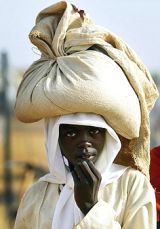Darfur displaced endure daily battle to survive
ABU SHOUK, Sudan, May 26 (AFP) — Forced out of her home and with no immediate prospect of returning, 21-year-old mother of two Kalthoum Daud Mohammed faces a desperate daily battle to make ends meet.

|
|
A young Sudanese refugee walks through the Abu Shouk refugee camp near El Fasher in Darfur, Sudan, in August 2004 carrying a bag of grain on her head. (AFP). |
Mohammed is just one of the over two million people displaced by the two-year conflict in Sudan’s shattered western province of Darfur, which is due to be visited this weekend by UN Secretary General Kofi Annan.
“Things are tough, we have to struggle hard in order to survive,” said Mohammed who moved to the Abu Shouk camp for displaced people with her children, husband and parents a year ago.
“It was not our decision to be here, the war brought us to this place,” added Mohammed, who hails from the small village of Jabel See, 150 kilometers (90 miles) away.
Sudanese and African Union officials said in recent days that calm had begun to return to Darfur, ahead of key June 10 peace talks between Khartoum and rebels, but for the refugees signs of improvement are few and far between.
There are an estimated 70,000 displaced people in Abu Shouk which lies just outside el-Fasher, the capital of North Darfur state, according to the camp’s manager Al-Fateh Abdul Aziz. “Until November, there were only 45,000,” he said.
More people were forced to leave their homes in recent months following renewed clashes between Sudanese government forces and Darfur ethnic minority rebels.
They took refuge in Abu Shouk and many still live in abysmal conditions in tiny huts made of grain stalk.
The media regularly refers to Abu Shouk as “the tourist camp” owing to better conditions compared to scores of other camps in the area.
More humanitarian agencies operate in Abu Shouk, whose huts are sturdier and better organized and where services are above average, aid agencies and government officials say.
But this means little to Mohammed and the new arrivals.
“The food is not enough and the medicines they give us rarely cures,” complained the mother, whose emaciated children show sure signs of malnutrition.
She calculated that each family would need about five times the current level of relief assistance just to get by.
In order to make ends meet, Mohammed and her husband do a variety of odd jobs in el-Fasher, including handwashing people’s clothes and digging pit latrines.
They use their meager income to buy basic staples such as milk and sugar, which the camp does not supply.
When they are not working for other people, they are busy laying mud bricks to build semi-permanent structures on their land allotment for relatives living in other parts of Abu Shouk to move in.
Queues are long at the clinics, as well as at water points.
But security appears to be good inside the camp. “We have a police station in the camp and military points five and 10 kilometers away,” said Abdul Aziz. “Until now nobody has been attacked in the camp,” he added.
But women who venture outside the settlement in search of firewood often complain of being attacked or raped.
For Mohammed, these incidents and many others are a reminder of the violence that forced them to leave their village. “The aircraft came and bombarded our houses and then armed men attacked us,” she recalled.
“They burnt our houses, murdered our relatives and stole all our property,” she added.
Abdul Aziz said the situation had improved considerably in Darfur’s villages and that as a result nearly 30 families have returned to their homes, with many more planning to leave the camp.
Mohammed disagreed. “Nobody has returned,” she said.
She said she had no plans to go back unless the security situation returned to normal, her family was properly compensated and perpetrators of atrocities were prosecuted and punished.
Annan is due to visit another camp — Kalma — on his visit to Darfur at the weekend as well as the nearby village of Lebedu, which was reportedly destroyed by government-sponsored Arab militiamen.
The launch of an uprising by Darfur ethnic minority rebels in early 2003 prompted the Khartoum government to unleash Arab militias in a scorched-earth campaign in which some 300,000 people have died.
